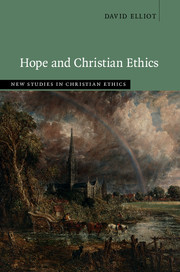Description
Hope and Christian Ethics
New Studies in Christian Ethics Series
Author: Elliot David
This book describes how the theological virtue of hope contributes to happiness in this life and not just the next.
Language: English
Subject for Hope and Christian Ethics:
Publication date: 07-2017
276 p. · 16x23.5 cm · Hardback
276 p. · 16x23.5 cm · Hardback
Description
/li>Contents
/li>Biography
/li>
The theological virtue of hope has long been neglected in Christian ethics. However, as social, civic and global anxieties mount, the need to overcome despair has become urgent. This book proposes the theological virtue of hope as a promising source of rejuvenation. Theological hope sustains us from the sloth, presumption and despair that threaten amid injustice, tragedy and dying; it provides an ultimate meaning and transcendent purpose to our lives; and it rejoices and refreshes us 'on the way' with the prospect of eternal beatitude. Rather than degrading this life and world, hope ordains earthly goods to our eschatological end, forming us to pursue social justice with a resilience and vitality that transcend the cynicism and disillusionment so widespread at present. Drawing on Thomas Aquinas and virtue ethics, the book shows how the virtue of hope contributes to human happiness in this life and not just the next.
1. The Eudaimonia gap; 2. The theological virtue of hope in Aquinas; 3. Rejoicing in hope; 4. Presumption and moral reform; 5. Despair and consolation; 6. The problem of worldliness; 7. Hope and the Earthly City; Bibliography; Notes; Index.
David Elliot is Assistant Professor of Moral Theology and Ethics at the Catholic University of America, Washington, DC. He received his Ph.D. in Moral Theology from the University of Notre Dame, followed by a three-year postdoctoral fellowship as Research Associate in Theological Ethics at the University of Cambridge, where he was concurrently a Research Associate in ethics at the Von Hügel Institute, St Edmund's College, Cambridge. His work on hope was recently awarded the Essay and Book Prize from the Character Project of the Templeton Foundation for its contribution to the study of character.
© 2024 LAVOISIER S.A.S.




